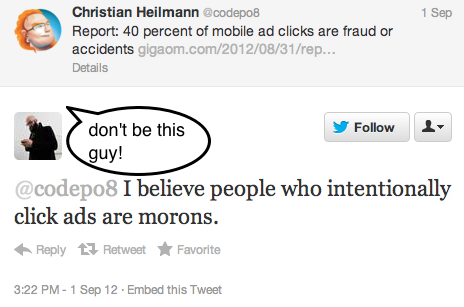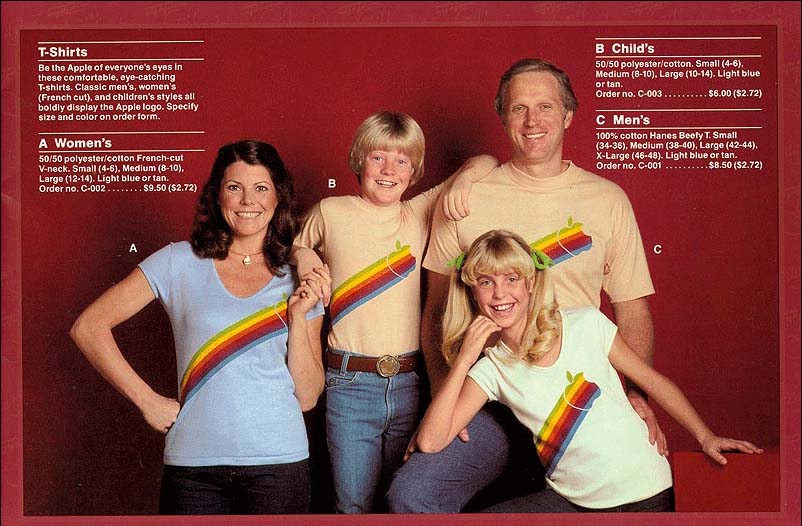Why “just use Adblock” should never be a professional answer
Sunday, February 2nd, 2014 at 3:59 pmAhh, ads. The turd in the punchbowl of the internet party. Slow, annoying things full of dark interaction patterns and security issues. Good thing they are only for the gullible and not really our issue as we are clever; we use browsers that blocked popups for years and we use an ad blocker!

Hang on a second. Whether we like it or not, ads are what makes the current internet work. They are what ensures the “free” we crave and benefit from, and if you dig deep enough you will find that nobody working in web development or design is not in one way or another paid by income stemming from ad sales on the web. Thus, us pretending that ads are for other people is sheer arrogance. I’ve had discussions about this a few times and so far the pinnacle to me still was an answer I got on Twitter to posting an article that 40 percent of mobile ad clicks are fraud or accidents:

I believe people who intentionally click ads are morons
Don’t get me wrong: ads as a whole are terrible. In many cases they have the grace of a drunk guy kicking you in the shin before asking you to buy him a beer. They are very much to blame for our users being conditioned to things behaving in weird ways on the web, thus opening the door for the bad guys to phish and clickjack them. Ads may also be the thing that drives many of our users to preferring apps instead. Which is kind of ironic as an app in many cases is a mixture of a bit of highly catered functionality wrapped in an interactive ad.
We’re blocking our own future
So what does that make us? Not the intelligent people who know how to game the system, but people not owning the platform we work for and are reliant on. As people in the know, it should be our job to ensure ads we publish or include in our project are not counterproductive to the optimisation efforts we put into our work. We also should have a stake in the kind of ads that are being displayed, making sure they don’t soil the messages we try to convey with our content.
A lack of empathy and a lie to ourselves
This is uncomfortable, it is extra work and it feels like we are depriving ourselves of an expert shortcut. The problem with blocking ads ourselves is though that we are not experiencing what our end users experience. We get the first class treatment of the web with comfortable computers and less interruptions whilst our users are stuck in a low cost carrier where they get asked every few seconds if they don’t want to buy something and pay extra if they forgot to bring the printout of their ticket.
By blocking all the ads and advocating for “clever web users” to do the same we perpetuate a model of only the most aggressive and horrible ads to get through. We treat each ad the same, the “find sexy singles in your IP range” and the actual useful ones: we just block them all. Yes, I’ve had some deals by clicking an ad. Yes, I found things I really use and am happy to have now by clicking an ad. I could have never done that with an ad blocker. What it does though is cut into the views of ads and thus force ad companies to play dirty to get the figures they are used to and use to negotiate payments to the people who display their ads. In essence, we are creating the terrible ads we hate as we don’t allow the good ones to even show up. It’s like stopping people swearing by not allowing anyone to speak. Or trying to block adult content by filtering for the word “sex”.
The current ad model is too comfortable and can be gamed
You could say that people who expect everything to be free don’t deserve better. This would hold water if the paid experiences of the web without ads were better or even available. In many cases, they are not. You can not pay for Facebook to get rid of ads. Many providers are so comfortable in the horrible model of “plaster everything with ads and create as much traffic as possible” that trying a subscription model instead bears too much danger and extra effort in comparison.
A sign of this is the horrible viral bullshit world we live in right now. Creators of original content are not the ones who make the most money with it; instead it is the ones who put it in “this kid did one weird trick, the result will amaze you” headlined posts with lots of ads and social media sharing buttons. This is killing the web. We allowed the most important invention for publishing since the printing press brought literacy to the masses to become a glossy lifestyle magazine that spies on its readers.
It should be up to us to show better ways, to create more engaging interfaces, to play with the technology and break conventions. It is sad to see that all we have to show for about 16 years of web innovation is that we keep some parts of our designs blank where other people can paste in ads using code we don’t even know or trust or care to understand. This isn’t innovative; this is lazy.
There’s more to come here and some great stuff brewing in Mozilla Labs. It is time to be grown-up about this: ads happen, let’s make them worth-while for everyone involved.
